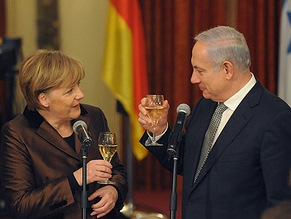|
World Jewish News

On Monday, German Chancellor Angela Merkel and Israeli Prime Minister Benjamin Netanyahu presided over a joint session of the German and Israeli cabinets, at which 10 German ministers were present.
|
Egypt unrest dominates Angela Merkel's Israel visit
02.02.2011, Israel The unrest sweeping the Middle East dominated the second day of talks between Israeli and German leaders on Tuesday, with President Shimon Peres warning of the possible rise of religious dictatorships.
"If the day after elections you get an extremist religious dictatorship, what are these democratic elections worth?" Peres said ahead of talks with German Chancellor Angela Merkel.
His remarks came as Egypt wrestles with a wave of unprecedented anti-government protests, which have pitted hundreds of thousands of demonstrators against the regime of President Hosni Mubarak.
Peres said the rise of the Islamist Hamas movement, which won Palestinian elections in 2006 then took over the Gaza Strip a year later, should serve as an example to those backing hastily imposed democracy.
"Democracy cannot start and end with elections. Real democracy starts the day after the elections by granting human rights," said Peres.
His remarks echoed comments by Prime Minister Benjamin Netanyahu, who warned on Monday of the dangers of an Iranian-style regime led by Islamic extremists arising out of the political chaos sweeping through Egypt.
The volatile situation in Egypt, which comes hot on the heels of the revolution in Tunisia that ousted president Zine El Abdine Ben Ali, has sparked fears in Israel about the loss of its closest regional ally, Mubarak.
Netanyahu on Tuesday insisted that the international community must demand that any future Egyptian government respect the 30-year peace treaty with Israel.
"Israel believes that the international community must demand that any Egyptian government must preserve the peace treaty with Israel," he was quoted as saying in a statement from his office.
Until now, Israel has stayed largely silent on the developments in Egypt, with Netanyahu ordering his ministers not to make any public remarks about the developments in Egypt, which signed a peace treaty with Israel in 1979.
The Egyptian situation dominated talks with Merkel, who on Tuesday admitted the scale of the problems there had largely escaped the notice of the international community.
"For decades, we have all respected Mubarak's commitment to peace... (but) there are obviously problems in Egypt which have come to light, problems which were not clearly known, and whose magnitude we didn't grasp until now," she said.
"There is a large consensus on the question of how the political process can evolve in Egypt and one can only hope that everything goes peacefully."
She also used the unrest in Egypt to spur Israel to resume negotiations with the Palestinians.
"The peace process must not stand still, above all in this very volatile situation," she said. "The events in Egypt must not be an excuse for stopping the peace process," she said.
Netanyahu said that while radical Islam was not the root cause of Egypt's troubles, history showed that civil disturbance could by exploited by Islamist groups.
"In a time of chaos, an organized Islamic group can take over the state. It happened in Iran and it also happened in other places," he said at the press conference.
Merkel said that under the circumstances a continued deadlock in Israel-Palestinian talks was not viable.
"In the next days, it will be even more important to act wisely, especially regarding the peace talks," she said. "Negotiations have to be restarted as soon as possible. Standing still is not a rational option."
Direct talks between Israel and the Palestinians broke down late last year in a row over settlement construction.
On Monday, Merkel and Netanyahu presided over a joint session of the German and Israeli cabinets, at which 10 German ministers were present.
The two sides signed a number of bilateral agreements dealing with crime and terrorism, as well as cooperation on climate change and renewable energy.
During her 2008 visit, Merkel gave a landmark address to the Knesset, Israel’s parliament, on the 60th anniversary of the founding of the Jewish state.
EJP
|
|
